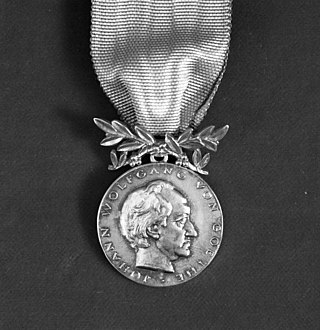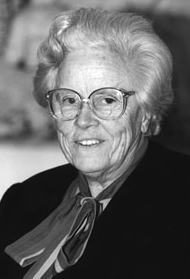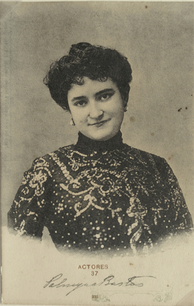Related Research Articles

Marisa dos Reis NunesComIH, known professionally as Mariza, is a Portuguese fado singer.
Werner Schwab was an Austrian playwright and visual artist.

Beatriz da Silveira Moreno Batarda is a British-born Portuguese actress named as one of European films 'Shooting Stars' by European Film Promotion in 1998. She studied design at IADE Institute in Lisbon and trained in acting at Guidhall School of Music and Drama in London.

The Goethe Medal, also known as the Goethe-Medaille, is a yearly prize given by the Goethe-Institut honoring non-Germans "who have performed outstanding service for the German language and for international cultural relations". It is an official decoration of the Federal Republic of Germany. The prize used to be given on 22 March, the anniversary of Goethe's death. Since 2009, it has been given on 28 August, the anniversary of Goethe's birth. The first awards were made in 1955. In the intervening years, through 2018, a total of 348 women and men from 65 countries have been so honored. It is not to be confused with Goethe-Medaille für Kunst und Wissenschaft (1932–1944) and Goetheplakette der Stadt Frankfurt am Main.

Lídia Jorge is a prominent Portuguese novelist and author whose work is representative of a recent style of Portuguese writing, the so-called "Post Revolution Generation".

Marília Soares Pêra was a Brazilian actress, singer, and stage director. Hailed as "one of the decade's [1980s] ten best actresses" by Pauline Kael, Pêra won the National Society of Film Critics Award for Best Actress in 1982 for her role in Hector Babenco's acclaimed Pixote, and received Best Actress awards at the Gramado Film Festival and at the Cartagena Film Festival for Carlos Diegues' Better Days Ahead. Other films include Bar Esperança, Angels of the Night, and Diegues' Tieta do Agreste.

Teatro Aberto is a theatre located in Lisbon, Portugal next to the Praça Espanha.

Milú was a Portuguese actor and singer.
Rui Manuel Correia Knopfli was a Mozambican writer.

Carole Fréchette is a Canadian playwright. She won the Siminovitch Prize in 2002. To date she has written more than a dozen plays including The Four Lives of Marie, The Seven Days of Simon Labrosse, Helen's Necklace, John and Beatrice, The Little Room at the Top of the Stairs, and most recently: Thinking of Yu.

Sonia Antinori is an Italian playwright, actress, theater director and translator. She has studied visual arts, theater and ballet, and graduated from the University of Florence. Since 1990, she has been working in Italy and in other countries abroad. Her plays have been presented at several festivals and theaters, broadcast and translated into, among others, German, English, French, Spanish, Polish, Bosnian, Turkish.

Maria João David da Silva Bastos is a Portuguese actress. She has participated in several Brazilian productions, becoming a known actress in Brazil.

Maria de Lourdes Belchior Pontes• Großes Verdienstkreuz • GCRB • Officier • GCIH • ComSE • GCIP •, was a Portuguese writer, poet, professor and diplomat who lived in Portugal, Brazil, France and the United States of America.
Laura Alves was a Portuguese actor on stage, film and radio.

Palmira Bastos (1875–1967) was one of the best-known Portuguese stage actresses in the first half of the 20th century.

Amélia Lafourcade Schmidt Rey Colaço de Robles Monteiro was one of the leading Portuguese actors of the first half of the 20th century. She was also an important impresario.
Maria Rosa Colaço was a Portuguese teacher, writer and journalist.

Gertrudes Rita da Silva, often known just as Gertrudes, was a 19th-century Portuguese actress, who was particularly known for her comic performances.
Ana Zanatti is a Portuguese theatre, film and television actor, television presenter, novelist, children's book writer, poet and a women's- and LGBT-rights campaigner.
Julie Sergeant is a British-born actress who works in Portugal and Brazil.
References
- 1 2 3 4 Lusa. "Tradutora Vera San Payo de Lemos galardoada com Medalha Goethe 2006". PÚBLICO (in Portuguese). Retrieved 2020-12-31.
- 1 2 "VERA SAN PAYO DE LEMOS". Artistas Unidos (in European Portuguese). 2010-10-16. Retrieved 2020-12-31.
- ↑ "Vera San Payo de Lemos – TEATRO ABERTO" (in European Portuguese). Retrieved 2020-12-31.
- 1 2 3 "Vera San Payo de Lemos". IMDb. Retrieved 2020-12-31.
- 1 2 "Vera San Payo de Lemos" (in European Portuguese). Retrieved 2020-12-31.